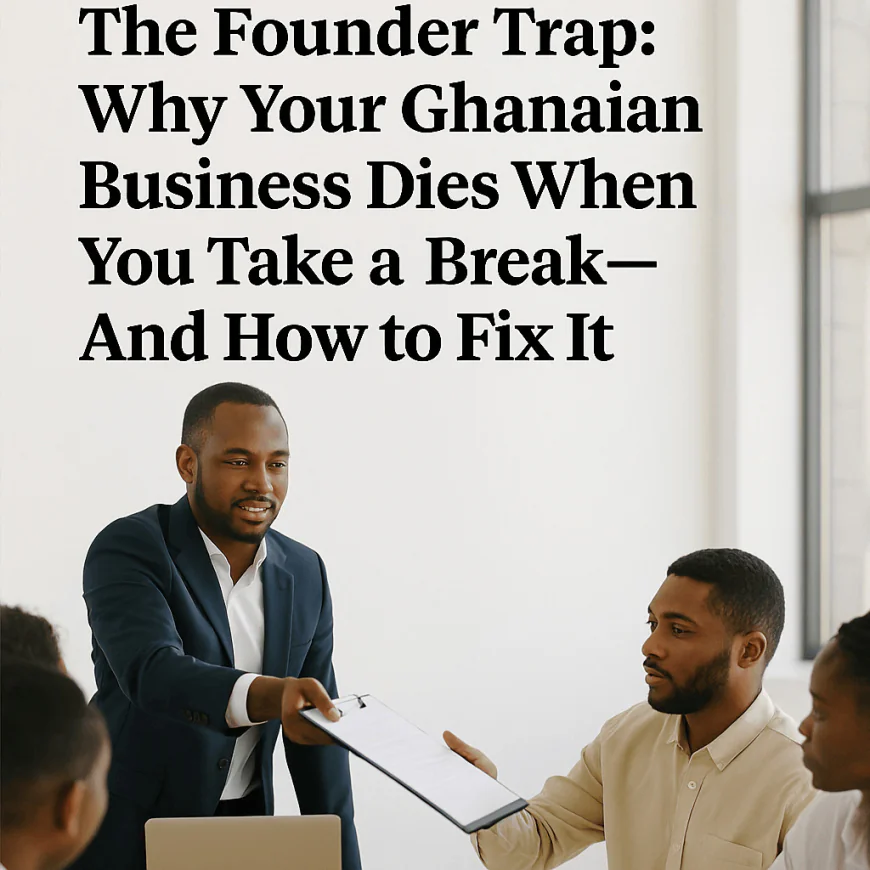The Founder Trap: Why Your Ghanaian Business Dies When You Take a Break - And How to Fix It
Many Ghanaian businesses collapse when the founder steps away. This expert guide reveals why founder dependency is killing scale and how to build systems, teams, and assets that make your company thrive without you.

Every Ghanaian entrepreneur knows the hustle. You're the first to open the shop, the last to leave, the one fixing customer issues on WhatsApp at midnight. But here’s the brutal truth:
If your business can’t survive without you, it’s not a business. It’s a bottleneck.
Too many brilliant companies in Ghana collapse not because the idea failed, but because the founder never learned to step back.
Let’s break that cycle.
The Hidden Risk of Founder Dependency
You might feel like the glue holding it all together. But over-reliance on you means:
- No scalable structure
- No investor confidence
- No sale or exit potential
- And worst of all - no time for you to breathe
Think about it:
- Can your team operate for a week without calling you?
- Could someone else train a new hire without shadowing you?
- Would your customers still get quality service if you fell ill for a month?
If the answer is “no” you’re not running a business. You’re running a burnout plan.
1. Systematize What You Do (Even If It Feels “Too Small”)
Start with your repeatable tasks:
- How do you onboard a new client?
- What’s your exact delivery flow?
- How do you collect payments or respond to complaints?
Document it. Turn it into checklists, scripts, or Loom videos. This is your first step toward delegation.
“The goal isn’t to remove yourself from your business. It’s to remove yourself from being the only one who knows how things work.”
2. Build a Team That Thinks Not Just Follows
Many Ghanaian founders hire task-doers who require constant hand-holding.
Instead, hire operators people who can:
- Make smart decisions
- Improve systems
- Spot risks before you do
Pro tip: Give small ownership stakes or performance bonuses. Loyalty rises when your team sees themselves as stakeholders, not staff.
3. Replace Verbal Instructions With Operating Assets
Every time you repeat something verbally, you waste time and create inconsistency.
Instead:
- Use Google Docs or Notion to write SOPs
- Create video explainers via Loom
- Build a company “Playbook” for onboarding, sales, delivery, and finance
These become scalable assets that train future employees, impress investors, and reduce chaos.
4. Make Yourself Redundant (on Purpose)
You don’t need to vanish but you do need to step back regularly.
Try this:
- Leave your team for 2 days. What breaks?
- Fix it. Then leave for 4 days.
- Keep iterating until you can disappear without disaster.
This is how you test the strength of your system not just your hustle.
What Happens When You Do This?
Your business becomes:
- Valuable (investors want it)
- Scalable (teams can grow it)
- Sellable (you’re not the product)
You go from being the employee of your own company…
…to being the architect of a real enterprise.
Final Thought: Build Beyond Yourself
Ghana is full of high-potential founders who never scale because they’re too busy doing everything.
Your ideas deserve more.
Your community deserves continuity.
And you deserve rest.
The question isn’t “How do I stay in control?”
It’s “How do I build something that controls itself?”



